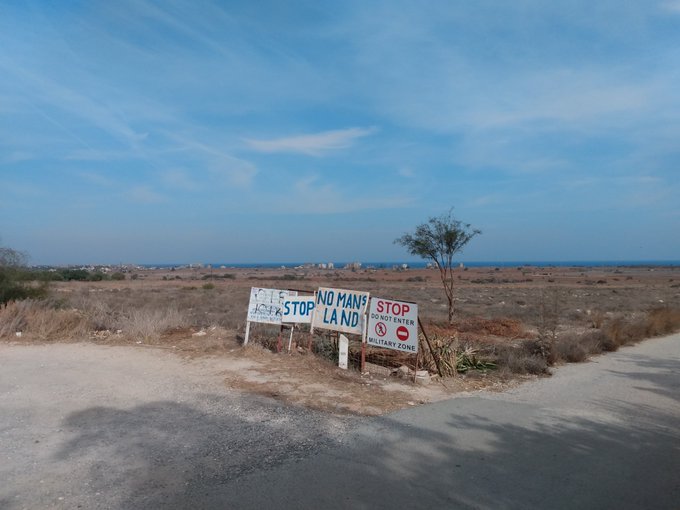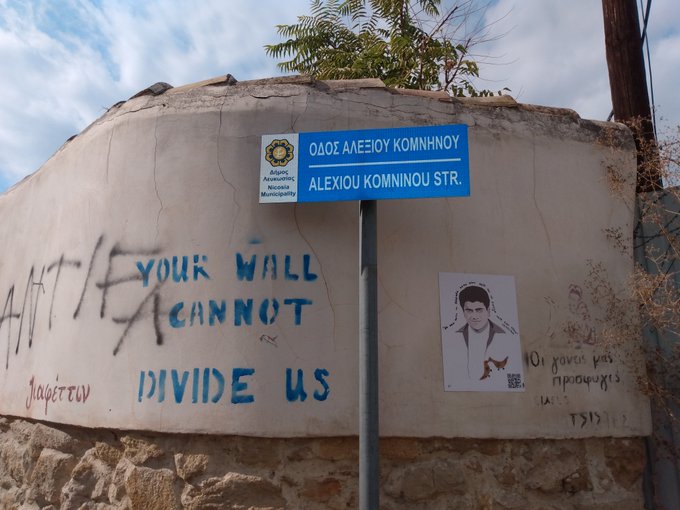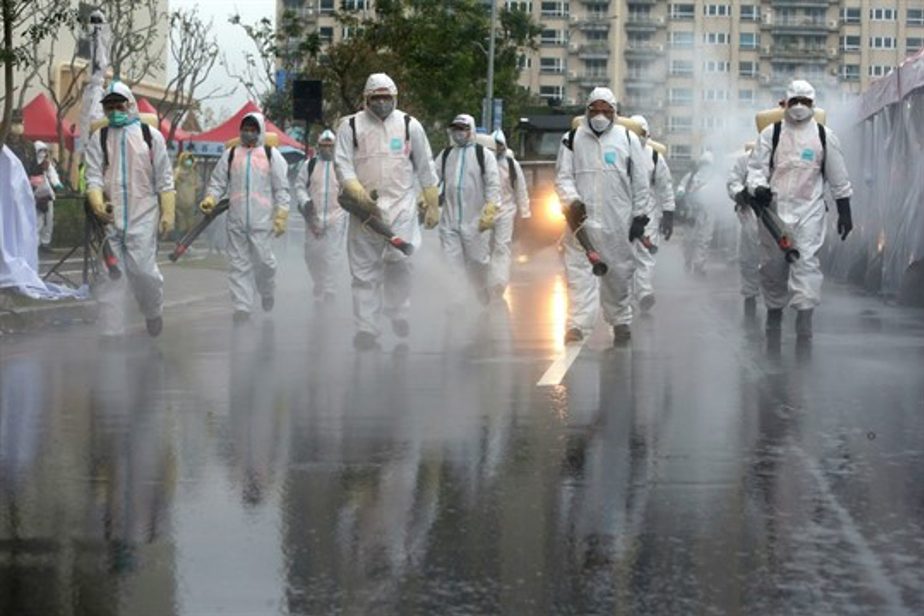2019 in Review: ‘No Take Backs?’
‘No take backs,’ is perhaps a staple of playground rules, but an improbability in international law. As politics change, powers wax and wane, and sketches of borders are erased and redrawn, the recognition of de facto states fluctuates. In 2019, Taiwan lost the recognition of the Solomon Islands and Kiribati, and Kosovo lost Palau, Togo, the Central African Republic, Ghana, and Nauru. Each withdrawal carries myriad rationale and ramifications… let’s dig in.
Recognition and its Implications
The recognition of de facto states is often a complex political and social process. The process is, nevertheless, crucial. As Thomas De Waal states in Uncertain Ground: Engaging with Europe’s De Facto States and Breakaway Territories: “diplomatic recognition… provide(s) the entry ticket to the international club of states… lack of recognition leaves the de facto states outside the door.” The politics of recognition are often dictated by external and internal political concerns projected on relations (or lack thereof) with the de facto state. Romania, for an example of internal factors, does not recognize Kosovo, (most likely) because of its own restive ethnic minority in Transylvania. The United States, as an example of external factors, does not recognize Taiwan in an attempt to bolster relations with Beijing. (these, of course, are not the only factors at play, but they serve as good examples regardless) Thus, the 2019 reversals of recognition of Taiwan and Kosovo carry significant internal and external political baggage with implications ricocheting beyond Taiwan and Kosovo.
Taiwan: All that Glitters is Gold
In 2019, within four days of each other, Taiwan lost two Pacific partners—Kiribati and the Solomon Islands—which shifted their relations to the People’s Republic of China. The Solomon Islands and Kiribati are two valuable nations in China’s ever growing incursion into the Pacific (check out the previous blog post on Bougainville for more information about China’s interest in the Pacific). The Pacific Islands are also important for Taiwan, and compromise approximately one third of the nations’ formal alliances. But, China’s financial magnetism is proving a better opportunity for the Pacific islands.
After the Solomon Islands’ “due diligence” –researching China’s relationships with other Pacific island nations (Vanuatu, Fiji, Samoa, Tonga, and Papua New Guinea)– the nation decided to pursue a more prosperous relationship with China. Financially, a switch in recognition proved more lucrative for the Solomon Islands, especially when China offered to “bankroll a development fund for the Solomon Islands.” Chinese financial interest in the Solomon Islands is nothing new. China, after all, receives two-thirds of the Solomon Islands exports. The switch in recognition does not come without ramifications. Anti-corruption organization Transparency Solomon Islands has expressed concern the nation will be unable to resist China’s interests.
In Kiribati, a 33 island chain with a population around 115,000 people, China’s economic promises proved more attractive than continued relations with Taiwan. Among other alleged aid was the promise of commercial airlines, something Taiwanese diplomats claim is simply unrealistic.
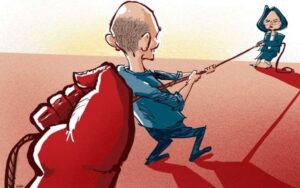
Source of the image: https://www.scmp.com/comment/opinion/article/3019711/will-taiwan-choose-china-or-choose-world-its-next-presidential
An Election: Taiwan, Beijing, and the Fight for Recognition
The Solomon Islands’ and Kiribati’s withdrawal of recognition has garnered a significant international response, especially in light of Taiwan’s recent presidential election.
After Taiwan lost the Solomon Islands and Kiribati, Beijing placed blame with the nation’s president, Tsai Ing-wen. Xiakeado—a social media outlet for the Communist Party’s propaganda machine People’s Daily—claimed: “as long as the DPP (Tsai’s party) is in power, sooner or later Taiwan will have zero diplomatic allies left… only by first improving cross-strait mutual trust can Taiwan open up its ‘international space.’” It is true Taiwan has become increasingly isolated under Tsai: however, the culprit maybe Beijing, not necessarily Tsai’s policy. China blocked Taiwan’s membership in the World Health Organization and the International Civil Aviation Organization.
In a rejection of Beijing’s influence, Tsai was re-elected in an overwhelming majority on January 11th. The fight for keeping (and growing) recognitions, however, continues… especially as China continues to project influence in the Pacific. The outlook isn’t all negative. In a recent bid to expand its influence to Tuvalu, China offered to build artificial islands to help the tiny nation grapple with rising sea levels. Tuvalu rejected China’s offer in a statement that explicitly re-affirmed the nation’s commitment to Taiwan. In fact, Tuvalu suggested uniting Taiwan’s remaining Pacific allies—Palau, the Marshall Islands, Nauru, and Tuvalu—in an effort to “counter the influence from mainland China.” What becomes of this ‘group’ is yet to be seen; nevertheless, Taiwan continues to fight for recognition under the sustained leadership of Tsai.
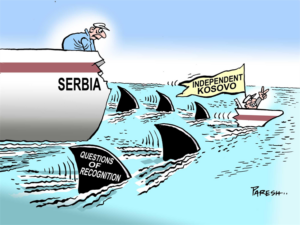
Source of the image: https://www.cagle.com/paresh-nath/2010/07/recognition-for-kosovo
Kosovo: lobbying, incentives, and dirty deeds?
In 2019, Kosovo lost two Pacific allies—Palau and Nauru—and three African allies—Ghana, Togo and The Central African Republic.
As with Taiwan and China, the revoking of recognition of Kosovo comes with the implicit (and often explicit) recognition of its parent state. Serbia has been actively involved in lobbying and incentivizing states against recognizing Kosovo. Its most recent successes, in the Pacific and Africa, mark a sustained effort from Belgrade to diminish Kosovo’s ability to interact in the international sphere, with Ivica Dacic, the Serbian Minister of Foreign Affairs, claiming “our goal is for that number of recognitions to drop below half of the total number of UN member states… (to ensure that) Kosovo leadership will not be able to behave as they wish.” While Serbia is honest in their campaign to diminish the number of Kosovo’s recognitions, they are, according to some, dishonest in their tactics.
Kosovo and Serbia have both endeavored to lobby their cases—recognition or not—on the international stage. Both nations, in their endeavors, have been accused of using bribery and corruption to influence foreign leaders. Kosovo (with the backing of the United States and Britain) and Serbia (with the alleged support of Russia) have made recognition a central focus of their geopolitical struggles with each other. While Kosovo’s loss of 5 allies certainly affects the state, the ramifications can be seen within a larger narrative of Kosovo and Serbia’s ongoing chess game of recognitions.
The Fight Continues
2019 saw the loss of recognitions for both Kosovo and Taiwan. While the withdrawal of recognitions represents different political situations in each nation, Taiwan’s and Kosovo’s losses symbolize the nations’ struggles against a larger political power with active interests to diminish their respective levels of recognitions, and ultimately their geopolitical power. China’s interests in the Pacific mirror their attempts to isolate Taiwan. Concurrently, although recognition may be more of their central focus, Serbia’s attempt to marginalize Kosovo informs their policy to isolate the nation.
As 2020 starts, it will be interesting to view the next moves in the international recognition of de facto states. Taiwan, with Tsai’s endorsed presidency, will grapple with China’s interests in the Pacific… Will Tuvalu’s suggested Pacific partnership succeed, or will Taiwan find itself more and more alone? Will Serbia and Kosovo’s recognition chess-match produce impactful results, or will their international partners tire of the nations’ persistent conflict? Perhaps, only time will tell.
Author: Annie Rose Healion


